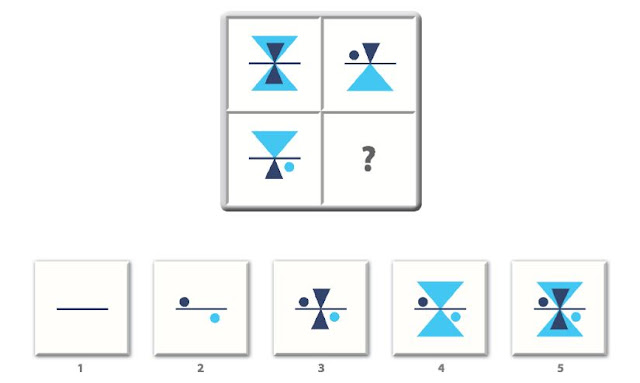
A Primer On Raven’s Progressive Matrices
The Raven's Progressive Matrices (RPM) is a non-verbal intelligence test designed to assess your non-verbal reasoning, abstract reasoning, problem-solving abilities, and cognitive functioning. It was developed by John C. Raven in 1936 and has since become one of the most renowned intelligence tests.
The test is particularly valuable because it can be administered across diverse linguistic and cultural backgrounds, as it relies on non-verbal visual patterns. The test consists of a series of diagrammatic puzzles, each with a pattern missing from a 3x3 or 4x4 matrix. The task is to identify the missing piece from a set of multiple-choice options based on the patterns, relationships, and rules observed in the presented figures. The complexity of the patterns and the tasks increases progressively as you move through the test.
Raven's Progressive Matrices are often used in educational, clinical, and employment settings to assess an individual's fluid intelligence or the capacity to solve novel problems and think logically. It doesn't rely on prior knowledge or specific cultural or educational backgrounds, making it a valuable tool for evaluating cognitive ability across a broad range of populations without the hindrance of a language barrier.
The calculation of the final score is not based on the percentage of correctly answered questions against the total amount of questions. This is because the complexity of the puzzle varies, so more difficult puzzles have more weighting given to them when you successfully answer them. As such, the final score is ranked as a percentile against a representative international population.
The Lean Startup And The Role Of Abstract Thinking
The lean startup methodology, popularized by Eric Ries, emphasizes a rapid and iterative approach to building and growing a business. It encourages entrepreneurs first to test their ideas in the real world to see if the product they are envisioning would help solve the stakeholder’s problem, gather data, and make data-driven decisions to refine their strategies.
The Lean Startup methodology poses a premise that every startup should attempt to answer the question "Should this product be built?" and not "Can this product be built?" The question is whether or not the product is feasible to build, but do the target consumers need the product? After all, the goal of innovation is to help solve preexisting problems. In this context, abstract thinking becomes a valuable asset. Here is why this is essential for the success of lean startups:
1. Hones Problem-Solving Abilities
Startups often face novel challenges and unpredictable situations, so entrepreneurs need to be quick on their toes to solve these problems for their startups to succeed. Abstract thinking and astute problem-solving abilities enable entrepreneurs to analyze these issues from multiple perspectives and devise creative solutions.
2. Innovation
Innovation is at the heart of every successful startup. Abstract thinking fosters a mindset that is open to new ideas and approaches—out-of-the-box thinking, as they would call it—driving innovation and differentiation in the market.
3. Decision-Making
Lean startup success relies on making informed decisions quickly. As the CEO of a startup, you can’t take forever to decide on something, but you can’t just make snap decisions without thoroughly weighing all its implications based on the data at hand. In this context, if you are an astute abstract thinker, you will be able to distill complex data and variables into clear insights, which would aid in data-driven and informed decision-making.
4. Adaptability
Startups need to pivot and adapt their strategies based on feedback and changing circumstances. Abstract thinking facilitates adaptability by enabling entrepreneurs to connect seemingly unrelated concepts and see new opportunities in the face of challenges.
5. Resource Management
Lean startups often have limited resources. Abstract thinkers are more efficient at resource allocation and finding unconventional solutions to challenges.
Mastering Raven's Progressive Matrices
Raven's Progressive Matrices is a renowned tool for evaluating abstract reasoning and problem-solving skills. Aside from being a gauge of your current abilities, RPM can also serve as a practice to enhance your problem-solving and conceptual thinking skills. To harness the full potential of abstract thinking in the context of a lean startup, consider the following strategies:
• Practice Regularly
Just like any other skill, abstract thinking can be improved with lots of practice. If you dedicate time to solving puzzles in the Raven's matrices, you will eventually sharpen your abstract thinking abilities.
Moreover, since the test requires strong visual-spatial skills, engaging in activities that enhance your ability to perceive and manipulate visual patterns will help improve your abilities. Puzzles, brain teasers, and games like Sudoku, chess, and Tetris can help develop these skills.
And remember, when solving the matrices, look for patterns, symmetries, and relationships between elements. Pay close attention to details like the direction, color, number, and position of the elements within the patterns.
• Embrace Diverse Perspectives
Abstract thinking benefits from exposure to diverse perspectives and ideas. Engage in discussions, seek out different viewpoints, and explore fields beyond your expertise. This broadens your mental horizons and enhances your ability to see connections in seemingly unrelated concepts.
• Foster A Growth Mindset
A growth mindset, as coined by the psychologist Carol Dweck, is the belief that abilities and intelligence can be developed through dedication and hard work. If you continuously practice with Raven’s Progressive Matrices and combine them with a mindset that embraces challenges and learns from failures, you will inevitably nurture your abstract thinking abilities.
• Apply Abstract Thinking to Real-World Challenges
Translating abstract thinking into practical solutions is key to startup success. Apply your skills to the real-world challenges that your startup faces. Test your problem-solving abilities, analyze data, and develop innovative strategies based on your abstract insights.
The Road To Lean Startup Success
In the dog-eat-dog world of lean startups, where innovation and agility are paramount to success, abstract thinking emerges as a powerful tool that budding entrepreneurs must possess. Mastering Raven's Progressive Matrices can be a valuable step in nurturing your cognitive agility and problem-solving skills.
As you develop your abstract thinking abilities, you will find yourself better equipped to navigate the unpredictable terrain of entrepreneurship, adapt to changing circumstances, and uncover the innovative solutions that will drive your startup to success. Remember, abstract thinking and being agile is not an end but a means to unleash the full potential of your lean startup journey.


